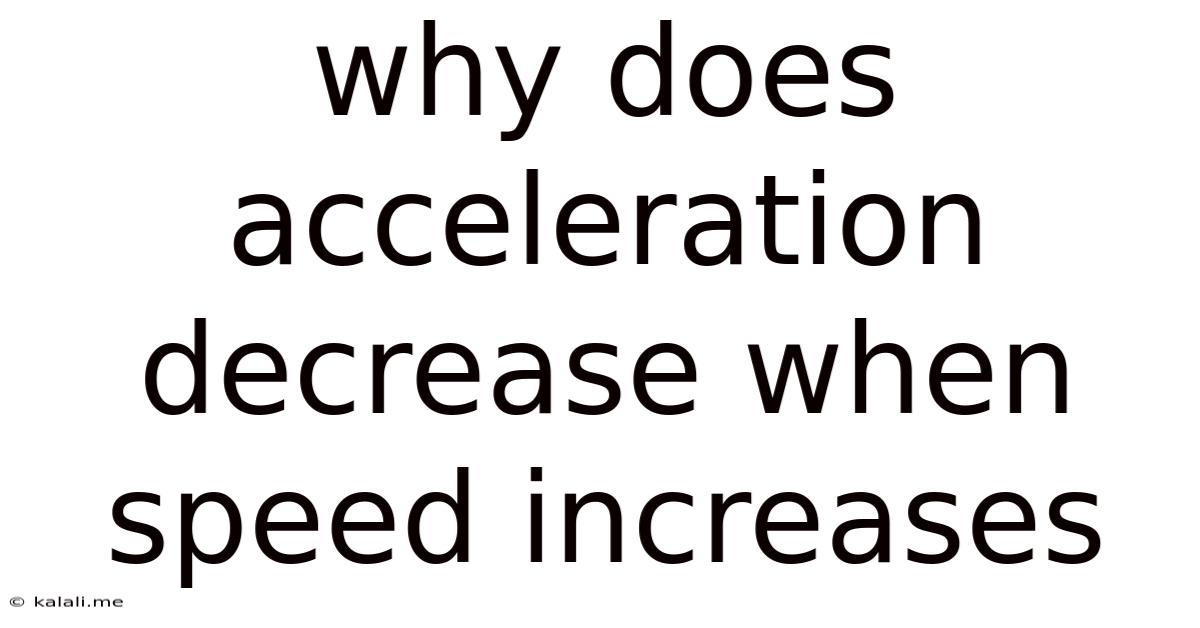Why Does Acceleration Decrease When Speed Increases
Kalali
Jun 10, 2025 · 3 min read

Table of Contents
Why Does Acceleration Decrease When Speed Increases? Understanding the Relationship Between Speed and Acceleration
Many people intuitively understand that acceleration involves increasing speed. However, the relationship isn't always linear. In fact, in many real-world scenarios, acceleration often decreases as speed increases. This article will explore the physics behind this phenomenon, using clear examples to illustrate the concept. Understanding this relationship is crucial for various fields, from automotive engineering to rocket science.
The Role of Forces and Resistance
The key to understanding why acceleration decreases with increasing speed lies in the forces acting on a moving object. Specifically, it's the interplay between the propelling force (the force causing the object to accelerate) and resisting forces (forces opposing motion). These resisting forces are often overlooked in simplified physics problems but become increasingly significant at higher speeds.
Common resisting forces include:
- Air resistance (drag): This force increases dramatically with speed. The faster an object moves through air, the more air molecules it collides with, resulting in a larger opposing force. Think about the difference between walking and cycling – air resistance is barely noticeable when walking but becomes very significant when cycling at high speed.
- Friction: While friction can be significant at low speeds, its impact often pales in comparison to air resistance at higher speeds, particularly for streamlined objects.
- Rolling resistance: For vehicles with wheels, this resistance is caused by the deformation of the tires and the road surface. It's generally less speed-dependent than air resistance.
The Physics Behind the Deceleration of Acceleration
Newton's second law of motion states that the net force (F) acting on an object is equal to its mass (m) multiplied by its acceleration (a): F = ma.
As speed increases, resisting forces, particularly air resistance, also increase. This means the net force acting on the object—the difference between the propelling force and the resisting forces—decreases. Since the net force is directly proportional to acceleration (F = ma), a decrease in net force results in a decrease in acceleration.
Imagine a car accelerating from a standstill. Initially, the engine's force is far greater than air resistance, resulting in high acceleration. As the car speeds up, air resistance increases, reducing the net force and causing acceleration to gradually decline. Eventually, the car will reach a point where the propelling force equals the resisting forces; at this point, the net force becomes zero, and the car stops accelerating – it reaches its terminal velocity.
Real-world Examples
- Cars: A car's acceleration is highest at low speeds and decreases progressively as speed increases. This is primarily due to the increasing air resistance.
- Parachutes: Parachutes are designed to maximize air resistance, quickly decreasing the speed of a falling object. The larger the parachute, the greater the air resistance and the faster the deceleration.
- Rockets: While rockets have powerful engines capable of generating massive thrust, they still experience a reduction in acceleration as speed increases due to factors such as air resistance and the decreasing mass of the rocket as fuel is consumed.
Conclusion
The decrease in acceleration with increasing speed isn't a violation of physics; it's a direct consequence of Newton's second law and the significant role of resisting forces, primarily air resistance, at higher speeds. Understanding this fundamental concept is essential for accurate modeling and prediction of motion in various contexts, encompassing engineering, sports science, and beyond. The relationship between force, mass, acceleration, and speed is intricately woven, creating a dynamic system that shapes the motion of objects in our world.
Latest Posts
Latest Posts
-
How Much Oz In A Bottle Of Water
Jul 01, 2025
-
How Long Does It Take To Drive 10 Miles
Jul 01, 2025
-
How Many 9s Are In A Deck Of Cards
Jul 01, 2025
-
How Many Pounds Are In 2 5 Kg
Jul 01, 2025
-
Which Is Greater 2 3 Or 2 4
Jul 01, 2025
Related Post
Thank you for visiting our website which covers about Why Does Acceleration Decrease When Speed Increases . We hope the information provided has been useful to you. Feel free to contact us if you have any questions or need further assistance. See you next time and don't miss to bookmark.